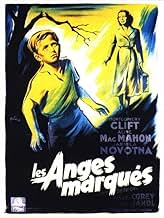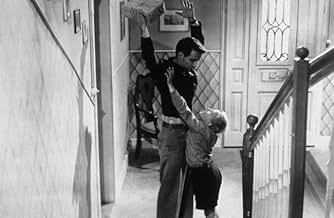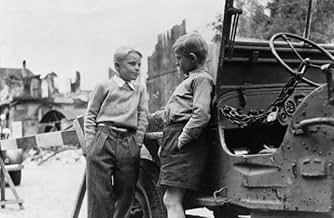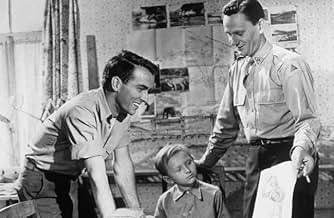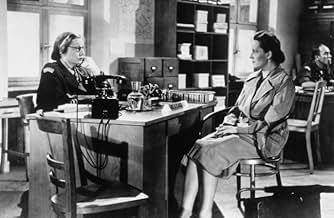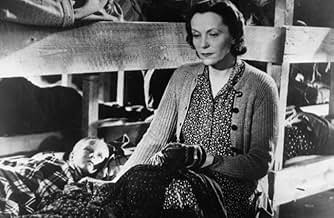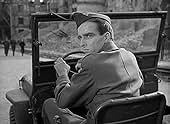ÉVALUATION IMDb
7,8/10
5,2 k
MA NOTE
Dans le Berlin d'après-guerre, un soldat américain aide un garçon tchèque perdu à retrouver sa mère.Dans le Berlin d'après-guerre, un soldat américain aide un garçon tchèque perdu à retrouver sa mère.Dans le Berlin d'après-guerre, un soldat américain aide un garçon tchèque perdu à retrouver sa mère.
- A remporté 1 oscar
- 7 victoires et 7 nominations au total
Avis en vedette
MONTGOMERY CLIFT is the nominal star of THE SEARCH but it's little Ivan Jandl that audiences were likely to remember after watching this spellbinding story of his plight as a victim of war amid separation from his mother. Clift is firmly in command of his role as a compassionate soldier who takes the boy under his wing and teaches him to communicate in English. Wendell Corey is excellent as a soldier friend of Clift and opera singer Jarmila Novotna is totally convincing as the boy's mother intent on being reunited with her son.
Another pivotal role is filled brilliantly by ALINE MacMAHON in a part that surely deserved an award nomination. At any rate, Clift deserved his nomination as Best Actor and Ivan Jandl fully deserved his special Oscar as the juvenile lead. His facial expression and eyes tell the whole story without a single bit of dialogue. The only other child actor I can compare him with (at that time) is Claude Jarman, Jr. who showed a natural skill for performing at a tender age.
The impact of the devastation of war on ruined buildings is caught by the camera vividly in on location footage shot in Germany under Fred Zinnemann's expert direction. But it's the impact of war on the very young children that is the focus of this film and to that end it succeeds brilliantly in capturing the grief and loneliness of all those victims of war in a way that is sure to stir your emotions.
Summing up: gritty post-war film, honest emotionally and powerful in its presentation. Highly recommended.
Another pivotal role is filled brilliantly by ALINE MacMAHON in a part that surely deserved an award nomination. At any rate, Clift deserved his nomination as Best Actor and Ivan Jandl fully deserved his special Oscar as the juvenile lead. His facial expression and eyes tell the whole story without a single bit of dialogue. The only other child actor I can compare him with (at that time) is Claude Jarman, Jr. who showed a natural skill for performing at a tender age.
The impact of the devastation of war on ruined buildings is caught by the camera vividly in on location footage shot in Germany under Fred Zinnemann's expert direction. But it's the impact of war on the very young children that is the focus of this film and to that end it succeeds brilliantly in capturing the grief and loneliness of all those victims of war in a way that is sure to stir your emotions.
Summing up: gritty post-war film, honest emotionally and powerful in its presentation. Highly recommended.
I got to this movie randomly in the night program and found it was rather undeservedly relegated to past 11pm duties on TV. For Germans, it may be hard to chew the past concentration camp experiences of Children survivors in English and American orphanages and the highlighted search of a mother for her young boy, from whom she has been separated during the war. Sentimental : Yes Heart Gripping : Yes Wonderful to watch to the (happy ???) ending ? Yes all over. Great performances by the young boy, Ivan Jandl, the mother and the orphanage manager and very convincing performances of Montgomery Clift and Wendell Corey as teachers and father stand ins. I do know the ending, but it grips me nevertheless, even on replay. And if you're not icy to the heart, it will do the same for you.
The Search (1948)
This is a critical film in director Fred Zinnemann's career. After years of doing shorts and B features, and after WWII had ravaged the world, he turned to a subject that must have ripped him up every day he was shooting. The story of orphaned kids, most of the Jewish, in the rubble of post-War Germany.
You see, both his parents were killed by the Nazis in the war. And here he was, a man with roots in documentary film in the 1930s, making real one of the remaining problems recovering from Nazi mess, these displaced children. The black and white filming is gritty and polished at the same time, and much of it is shot on location in the real ruins of Germany in the American sector (in Nuremberg). For that alone it's worth seeing.
By the way, the interior work was done in a Swiss garage—the crew for the whole film consisted of a total of ten Swiss technicians and a truck. Though the movie was an American release, the main producer was Swiss, too. All of these are reasons why it feels different than what Hollywood might have attempted on studios lots, and probably failed at least in authenticity.
Throw in that Montgomery Clift is starring in the lead role and you have another reason to watch. He's really wonderful, already feeling like the mature, charming, disarming young man he is famous for on screen. Be warned however—he doesn't show up until nearly halfway through. The first half of the movie is touching but makes for disappointing drama, forming a quasi-documentary overview of the horrid situation but with a voice-over that means well but makes it almost sentimental instead of tragic. Be sure to stick it out until the real plot kicks in with Clift sitting in a Jeep.
There are other actors here—the mother looking for her child is an opera singer in real life and is more pathetic than persuasive, and the chief nurse, played by Aline MacMahon, is terrific. Still, the movie, and the screen time in the second half, is Clift's, thankfully, and the boy's. This child was discovered while scouting for the movie, apparently, and is a Czech kid names Ivan Jandl. Amazingly, he knew no English when the movie started, and was coached by Clift as they went, very much like happens in the movie. This obviously makes it more convincing top to bottom.
And makes you love Clift even more. He took the role quite seriously, studying (according to a TCM article worth googling) American soldier engineers by living with them, especially trying to get the way they walked. Fascinating details for a movie that depends on its verisimilitude above all.
If there is an inevitable arc to the events, you'll have to live with it. And if some of the acting is average, and some of the plot requiring patience, you'll have to live with that, too. It's not a gem taken whole. But the best of it is remarkable. An absolute must-watch if you like this period, the director, or even this kind of shooting, which has an echo of "Rome Open City" and other European productions shot in the actual remains of Old Europe.
This is a critical film in director Fred Zinnemann's career. After years of doing shorts and B features, and after WWII had ravaged the world, he turned to a subject that must have ripped him up every day he was shooting. The story of orphaned kids, most of the Jewish, in the rubble of post-War Germany.
You see, both his parents were killed by the Nazis in the war. And here he was, a man with roots in documentary film in the 1930s, making real one of the remaining problems recovering from Nazi mess, these displaced children. The black and white filming is gritty and polished at the same time, and much of it is shot on location in the real ruins of Germany in the American sector (in Nuremberg). For that alone it's worth seeing.
By the way, the interior work was done in a Swiss garage—the crew for the whole film consisted of a total of ten Swiss technicians and a truck. Though the movie was an American release, the main producer was Swiss, too. All of these are reasons why it feels different than what Hollywood might have attempted on studios lots, and probably failed at least in authenticity.
Throw in that Montgomery Clift is starring in the lead role and you have another reason to watch. He's really wonderful, already feeling like the mature, charming, disarming young man he is famous for on screen. Be warned however—he doesn't show up until nearly halfway through. The first half of the movie is touching but makes for disappointing drama, forming a quasi-documentary overview of the horrid situation but with a voice-over that means well but makes it almost sentimental instead of tragic. Be sure to stick it out until the real plot kicks in with Clift sitting in a Jeep.
There are other actors here—the mother looking for her child is an opera singer in real life and is more pathetic than persuasive, and the chief nurse, played by Aline MacMahon, is terrific. Still, the movie, and the screen time in the second half, is Clift's, thankfully, and the boy's. This child was discovered while scouting for the movie, apparently, and is a Czech kid names Ivan Jandl. Amazingly, he knew no English when the movie started, and was coached by Clift as they went, very much like happens in the movie. This obviously makes it more convincing top to bottom.
And makes you love Clift even more. He took the role quite seriously, studying (according to a TCM article worth googling) American soldier engineers by living with them, especially trying to get the way they walked. Fascinating details for a movie that depends on its verisimilitude above all.
If there is an inevitable arc to the events, you'll have to live with it. And if some of the acting is average, and some of the plot requiring patience, you'll have to live with that, too. It's not a gem taken whole. But the best of it is remarkable. An absolute must-watch if you like this period, the director, or even this kind of shooting, which has an echo of "Rome Open City" and other European productions shot in the actual remains of Old Europe.
This film marked the feature film screen debut of Montgomery Clift. It was not meant to be that way. Red River was made first, but held up in release due to a threatened lawsuit. So The Search ended up being the movie going public's first glimpse of Montgomery Clift.
They didn't get to see him until the film was only just about half way finished. The only character who is continuously on screen through out the film is little Ivan Jandl. What a performance too. The worst thing that could have happened to this film is to have some name Hollywood kid actor play that role. Young Ivan comes across as a real kid who went through horrors unimaginable in first world countries today.
Ivan is Czech and his family are singled out by the Nazis and put in Auschwitz. Father and sister are killed, mother and son are separated. The film is their search for each other.
Ivan after V-E Day is in another kind of camp, a refugee camp run by the United Nations Relief and Rehabilitation Agency. He's almost comatose from the shock of four years of horror. To him the men in uniforms are still to be feared even though it's not Nazi uniforms. He makes a break for it and GI Montgomery Clift picks him up and takes him back to his dwelling.
Ivan and Monty kind of grow on each other, but at the same time Ivan's mother played by Czech opera star Jarmila Novotna is pursuing her quest for her little boy. She comes to the UNRRA camp which is headed by Aline McMahon. This may very well be her best screen moment. McMahon also narrates large chunks of the film, describing the enormous task the UNRRA had in reuniting families all over Europe in addition to a whole lot of other things like food, clothing, and shelter.
Clift and Ivan have great chemistry. And no one ever portrayed sensitivity better than Montgomery Clift on the screen. You know how much empathizes with Ivan's plight with every look, every nuance, every gesture. Fred Zinneman got a great performance out of him and later on Zinneman directed Clift in his greatest film role in From Here to Eternity.
The film was shot in postwar Germany and the landscape itself and the looks of the people tell what they've been through. I wouldn't be surprised but that Clift's performance in The Search later on led him to being cast in The Big Lift, another film set in post World War II Germany.
Probably it was just as well Clift got his first exposure in this film. It guaranteed him co-star status with John Wayne when Red River finally did come out.
The Search 56 years later is a moving movie experience.
They didn't get to see him until the film was only just about half way finished. The only character who is continuously on screen through out the film is little Ivan Jandl. What a performance too. The worst thing that could have happened to this film is to have some name Hollywood kid actor play that role. Young Ivan comes across as a real kid who went through horrors unimaginable in first world countries today.
Ivan is Czech and his family are singled out by the Nazis and put in Auschwitz. Father and sister are killed, mother and son are separated. The film is their search for each other.
Ivan after V-E Day is in another kind of camp, a refugee camp run by the United Nations Relief and Rehabilitation Agency. He's almost comatose from the shock of four years of horror. To him the men in uniforms are still to be feared even though it's not Nazi uniforms. He makes a break for it and GI Montgomery Clift picks him up and takes him back to his dwelling.
Ivan and Monty kind of grow on each other, but at the same time Ivan's mother played by Czech opera star Jarmila Novotna is pursuing her quest for her little boy. She comes to the UNRRA camp which is headed by Aline McMahon. This may very well be her best screen moment. McMahon also narrates large chunks of the film, describing the enormous task the UNRRA had in reuniting families all over Europe in addition to a whole lot of other things like food, clothing, and shelter.
Clift and Ivan have great chemistry. And no one ever portrayed sensitivity better than Montgomery Clift on the screen. You know how much empathizes with Ivan's plight with every look, every nuance, every gesture. Fred Zinneman got a great performance out of him and later on Zinneman directed Clift in his greatest film role in From Here to Eternity.
The film was shot in postwar Germany and the landscape itself and the looks of the people tell what they've been through. I wouldn't be surprised but that Clift's performance in The Search later on led him to being cast in The Big Lift, another film set in post World War II Germany.
Probably it was just as well Clift got his first exposure in this film. It guaranteed him co-star status with John Wayne when Red River finally did come out.
The Search 56 years later is a moving movie experience.
After watching Roberto Rossellini's 1947 final part of his war trilogy "Germania anno zero", Fred Zinnemann's "The Search" is in direct contrast. While Rossellini approaches a similar subject with absorbing objectivity, "The Search" opts for sentimentality, although Zinnemann tried to add a documentary dimension to the story. It's the tale of a boy who is rescued by an American G.I. in Berlin, while the boy's mother is looking for him in refugee camps, after they were separated in Auschwitz during the war. Mother and child are pretty close but do not know it, so the story goes from scenes of the soldier educating the boy, to the mother's giving love to surrogate sons in a UN home for war orphans. Zinnemann's tact (or lack of passion, as some may say) nevertheless makes it work, as well as the performances by Montgomery Clift as the soldier and young Ivan Jandl as the kid, who won a special Oscar.
Le saviez-vous
- AnecdotesBen Mankiewicz on TCM indicated that Ivan Jandl spoke no English at the time this film was made, and that his English dialogue was phonetically memorized.
- GaffesOn Montgomery Clift's right shoulder, he wears the patch of the 102nd infantry division, but it is sewed on incorrectly; it is turned 90 degrees to the right.
- Citations
[Steve is teaching a young boy, whose name he does not know but has coined Jim, to speak English]
Ralph 'Steve' Stevenson: [to Jim] You have no idea how useful it's going to be for you to know English. You can go where ever you like. Everybody knows what 'OK' means. You can use English all over the world. Not, not just America: Canada, Africa, Australia, India. Even in England, they understand English... well, sort of.
- Autres versionsThere is an Italian edition of this film on DVD, distributed by DNA srl, "LA SETTIMA CROCE (1944) + THE SEARCH (Odissea tragica, 1948)" (2 Films on a single DVD), re-edited with the contribution of film historian Riccardo Cusin. This version is also available for streaming on some platforms.
- ConnexionsFeatured in Imaginary Witness: Hollywood and the Holocaust (2004)
Meilleurs choix
Connectez-vous pour évaluer et surveiller les recommandations personnalisées
- How long is The Search?Propulsé par Alexa
Détails
Box-office
- Budget
- 250 000 $ US (estimation)
- Durée1 heure 44 minutes
- Couleur
- Mixage
- Rapport de forme
- 1.37 : 1
Contribuer à cette page
Suggérer une modification ou ajouter du contenu manquant

Lacune principale
By what name was The Search (1948) officially released in India in English?
Répondre

